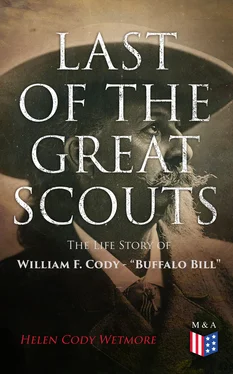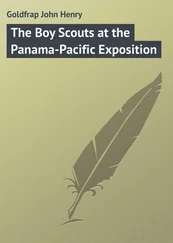Table of Contents
In presenting this volume to the public the writer has a twofold purpose. For a number of years there has been an increasing demand for an authentic biography of "Buffalo Bill," and in response, many books of varying value have been submitted; yet no one of them has borne the hall-mark of veracious history. Naturally, there were incidents in Colonel Cody's life—more especially in the earlier years—that could be given only by those with whom he had grown up from childhood. For many incidents of his later life I am indebted to his own and others' accounts. I desire to acknowledge obligation to General P. H. Sheridan, Colonel Inman, Colonel Ingraham, and my brother for valuable assistance furnished by Sheridan's Memoirs, "The Santa Fe Trail," "The Great Salt Lake Trail," "Buffalo Bill's Autobiography," and "Stories from the Life of Buffalo Bill."
A second reason that prompted the writing of my brother's life-story is purely personal. The sobriquet of "Buffalo Bill" has conveyed to many people an impression of his personality that is far removed from the facts. They have pictured in fancy a rough frontier character, without tenderness and true nobility. But in very truth has the poet sung:
"The bravest are the tenderest—
The loving are the daring."
The public knows my brother as boy Indian-slayer, a champion buffalo-hunter, a brave soldier, a daring scout, an intrepid frontiersman, and a famous exhibitor. It is only fair to him that a glimpse be given of the parts he played behind the scenes—devotion to a widowed mother, that pushed the boy so early upon a stage of ceaseless action, continued care and tenderness displayed in later years, and the generous thoughtfulness of manhood's prime.
Thus a part of my pleasant task has been to enable the public to see my brother through his sister's eyes—eyes that have seen truly if kindly. If I have been tempted into praise where simple narrative might to the reader seem all that was required, if I have seemed to exaggerate in any of my history's details, I may say that I am not conscious of having set down more than "a plain, unvarnished tale." Embarrassed with riches of fact, I have had no thought of fiction. H. C. W.
CODYVIEW, DULUTH, MINNESOTA, February 26, 1899.
CHAPTER I. — THE OLD HOMESTEAD IN IOWA.
Table of Contents
A PLEASANT, roomy farm-house, set in the sunlight against a background of cool, green wood and mottled meadow—this is the picture that my earliest memories frame for me. To this home my parents, Isaac and Mary Cody, had moved soon after their marriage.
The place was known as the Scott farm, and was situated in Scott County, Iowa, near the historic little town of Le Clair, where, but a few years before, a village of the Fox Indians had been located; where Black Hawk and his thousand warriors had assembled for their last war-dance; where the marquee of General Scott was erected, and the treaty with the Sacs and Foxes drawn up; and where, in obedience to the Sac chief's terms, Antoine Le Clair, the famous half-breed Indian scholar and interpreter, had built his cabin, and given to the place his name. Here, in this atmosphere of pioneer struggle and Indian warfare—in the farm-house in the dancing sunshine, with the background of wood and meadow—my brother, William Frederick Cody, was born, on the 26th day of February, 1846.
Of the good, old-fashioned sort was our family, numbering five daughters and two sons—Martha, Samuel, Julia, William, Eliza, Helen, and May. Samuel, a lad of unusual beauty of face and nature, was killed through an unhappy accident before he was yet fourteen.
He was riding "Betsy Baker," a mare well known among old settlers in Iowa as one of speed and pedigree, yet displaying at times a most malevolent temper, accompanied by Will, who, though only seven years of age, yet sat his pony with the ease and grace that distinguished the veteran rider of the future. Presently Betsy Baker became fractious, and sought to throw her rider. In vain did she rear and plunge; he kept his saddle. Then, seemingly, she gave up the fight, and Samuel cried, in boyish exultation:
"Ah, Betsy Baker, you didn't quite come it that time!"
His last words! As if she knew her rider was a careless victor off his guard, the mare reared suddenly and flung herself upon her back, crushing the daring boy beneath her.
Though to us younger children our brother Samuel was but a shadowy memory, in him had centered our parents' fondest hopes and aims. These, naturally, were transferred to the younger, now the only son, and the hope that mother, especially, held for him was strangely stimulated by the remembrance of the mystic divination of a soothsayer in the years agone. My mother was a woman of too much intelligence and force of character to nourish an average superstition; but prophecies fulfilled will temper, though they may not shake, the smiling unbelief of the most hard-headed skeptic. Mother's moderate skepticism was not proof against the strange fulfillment of one prophecy, which fell out in this wise:
To a Southern city, which my mother visited when a girl, there came a celebrated fortune-teller, and led by curiosity, my mother and my aunt one day made two of the crowd that thronged the sibyl's drawing-rooms.
Both received with laughing incredulity the prophecy that my aunt and the two children with her would be dead in a fortnight; but the dread augury was fulfilled to the letter. All three were stricken with yellow fever, and died within less than the time set. This startling confirmation of the soothsayer's divining powers not unnaturally affected my mother's belief in that part of the prophecy relating to herself that "she would meet her future husband on the steamboat by which she expected to return home; that she would be married to him in a year, and bear three sons, of whom only the second would live, but that the name of this son would be known all over the world, and would one day be that of the President of the United States." The first part of this prophecy was verified, and Samuel's death was another link in the curious chain of circumstances. Was it, then, strange that mother looked with unusual hope upon her second son?
That 'tis good fortune for a boy to be only brother to five sisters is open to question. The older girls petted Will; the younger regarded him as a superior being; while to all it seemed so fit and proper that the promise of the stars concerning his future should be fulfilled that never for a moment did we weaken in our belief that great things were in store for our only brother. We looked for the prophecy's complete fulfillment, and with childish veneration regarded Will as one destined to sit in the executive's chair.
My mother, always somewhat delicate, was so affected in health by the shock of Samuel's death that a change of scene was advised. The California gold craze was then at its height, and father caught the fever, though in a mild form; for he had prospered as a farmer, and we not only had a comfortable home, but were in easy circumstances. Influenced in part by a desire to improve mother's health, and in part, no doubt, by the golden day-dreams that lured so many Argonauts Pacificward, he disposed of his farm, and bade us prepare for a Western journey. Before his plans were completed he fell in with certain disappointed gold-seekers returning from the Coast, and impressed by their representations, decided in favor of Kansas instead of California.
Father had very extravagant ideas regarding vehicles and horses, and such a passion for equestrian display, that we often found ourselves with a stable full of thoroughbreds and an empty cupboard. For our Western migration we had, in addition to three prairie-schooners, a large family carriage, drawn by a span of fine horses in silver-mounted harness. This carriage had been made to order in the East, upholstered in the finest leather, polished and varnished as though for a royal progress. Mother and we girls found it more comfortable riding than the springless prairie-schooners.
Читать дальше












